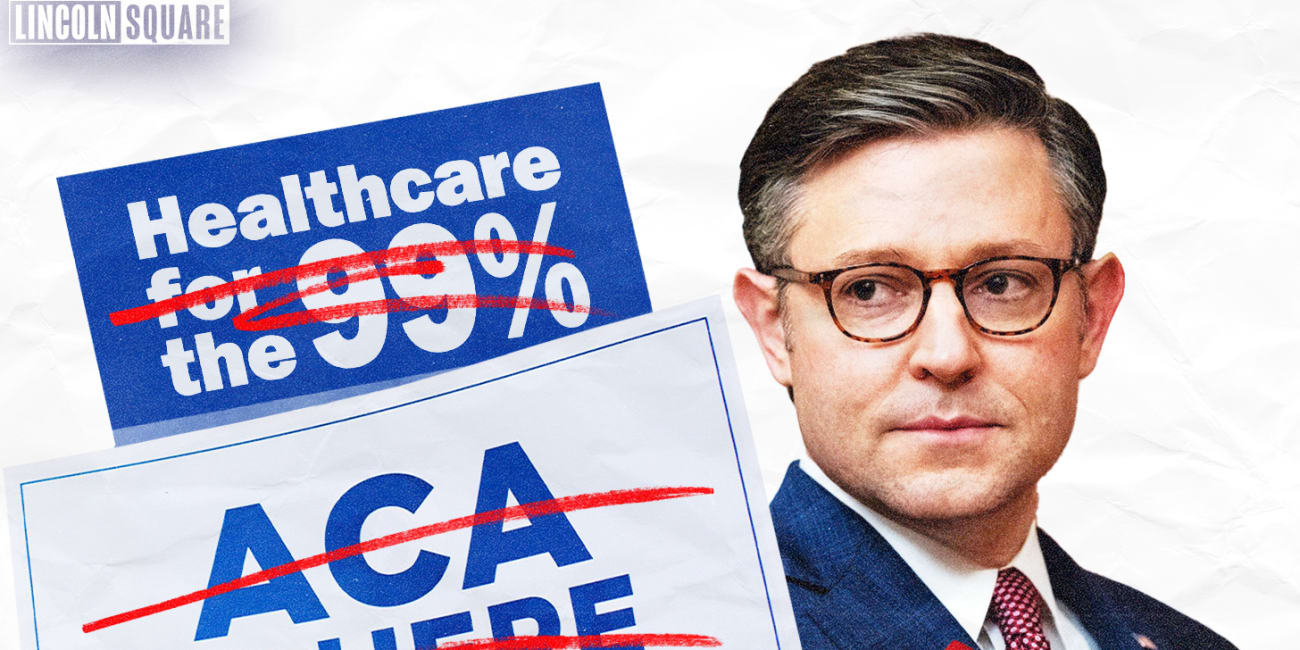|
 |
Get all-access to Lincoln Square content, and to help us amplify the content that you’re reading to Americans who aren’t paying attention, please consider upgrading your subscription today with this limited-time offer:
The Health Care Cuts in Trump’s Budget Bill Are Even Worse than You Think
About 22 million Americans could lose health insurance in the next decade — and there’s even more bad news beyond that.
A few weeks ago, the Congressional Budget Office (CBO) issued its official projection of just how much damage the combined effect of the House GOP's budget reconciliation bill (officially the "One Big Beautiful Bill Act") would cause to healthcare coverage in the U.S.
The estimates were sobering: Over 16 million Americans would lose coverage, over half of whom ( about 8.2 million) are currently enrolled in ACA exchange plans.
If this happens, it would mean the ACA exchange market would drop by more than one-third from the about 24.2 million currently enrolled (myself and my own family included.)
However, I've repeatedly stated that even this is likely a low estimate — the remaining roughly 16 million exchange enrollees would still be hit with massive (and in some cases eye-poppingly huge) premium hikes which would force them to drop to far worse plans (meaning much higher deductibles and copays, worse provider networks, and so on.)
There's also the ripple effect of insurance carriers either shrinking their footprint or dropping out of the exchange market altogether, as Aetna/CVS recently announced.
Now Wakely Consulting Group — one of the largest and most respected healthcare actuarial firms in the country — appears to agree with me, and then some:
A new white paper released today by Wakely Consulting Group, an HMA Company, (Wakely) examines the potential enrollment and premium impacts of the House budget reconciliation bill, H.R. 1, and the expiring subsidies for the ACA Individual Market.
“Future of the Individual Market: Impact of the House Reconciliation Bill and Other Changes on the ACA Individual Market” analyzes the effects of both the House budget reconciliation bill and the expiration of enhanced premium tax credits (ePTCs).
It determines the individual market will look fundamentally different when the full effects of all proposed changes occur. Specifically, the combination of ePTC expiring and full enactment of H.R. 1 could reduce individual market enrollment by 47% to 57% or between 11.2 and 13.6 million individual market enrollees.
“This range includes both direct impacts on subsidized individuals due to net premium increases after premium tax credits and loss of unsubsidized enrollment between 3.9% and 6.1% following significant gross premium increases,” the paper states. “Non-Medicaid expansion states would see especially large enrollment losses with reductions in enrollment ranging between 53% and 64%.
“… Remaining enrollees are likely to be sicker and to have higher healthcare needs than those who will drop coverage, which in turn will weaken the risk pool and drive up premiums.”
Other key findings from the Wakely paper include:
Estimated combined effects could increase gross market average premiums between 7% and 11.5% because of market attrition and residual risk pool morbidity increases, not accounting for incremental claims cost trend impacts.
H.R. 1 alone could reduce enrollment by 22% to 27%, or 5.2 to 6.4 million enrollees, when layered on top of the expiration of ePTCs.
Enrollment and premium impacts varied greatly by state; the range of enrollment reductions in some states exceeded the national average range of 47% to 57%, and premium changes also varied more widely than the average increase of 7% to 11.5%.
The combination of ending passive enrollment and pre-enrollment verification is estimated to reduce enrollment between 1.5 million and 3.3 million….
The pre-enrollment verification program alone is estimated to result in coverage losses of 720,000 to 2.2 million people.
The white paper itself also includes some critical additional warnings, which I referenced above:
If all provisions modeled go into effect, individual market enrollment could drop by 47 to 57 percent in 2026 (assuming full impact is seen in the first year), resulting in only 10.1 to 12.5 million enrollees remaining in the individual market.
Further, the enrollees who do remain could see their premiums rise solely because of shifts in single risk pool morbidity between 7.0 percent to 11.5 percent on average, based on gross premium costs before PTC. Those with PTC could experience significantly higher net premium cost increases.
It is important to note that these estimates do not account for other factors, such as rising healthcare costs or issuer market exits, which, in combination, could make the increases significantly higher.
… The expiration of ePTCs and CSR funding could result in substantial premium increases for lower-income members. For example, in states with significant silver-loading — where gold plan premiums are lower than silver plans — many low-income individuals now pay little or nothing for gold level coverage.
Without these subsidies, monthly premiums could rise dramatically. … These increases would likely be unaffordable for many households, potentially forcing them to downgrade to less generous plans or to leave the Marketplace altogether.
Unfortunately, Wakely doesn't break out their estimates by state, but they do break it out between the 40 states and Washington, D.C. which expanded Medicaid under the ACA, and the 10 which haven't done so, projecting both coverage losses and gross premium hikes to be even higher in the latter.
It actually gets even worse, since the study doesn’t include either Massachusetts or DC due to them having merged markets, nor does it include the impact on Basic Health Plan (BHP) programs, which cover around 1.8 million people in New York, Minnesota, and Oregon.
Using the midpoint avg. for Massachusetts and D.C. would add another approximately 182,000 to the tally, while a study by the New York Health Department. estimates that around 224,000 of their roughly 1.64 million BHP enrollees would lose coverage, or roughly 14% of the total. That would mean roughly 251,000 across all three states.
This would bring the grand total up to somewhere between 11.6 and 14 million losing coverage out of the about 26 million exchange QHP and BHP enrollees nationally.
It’s also important to remember that this doesn’t even include the about 7.8 million Medicaid enrollees the CBO expects to also become uninsured. Combined, that’s up to 21.8 million Americans who are at risk of losing coverage by 2034.
As if that’s not devastating enough, remember that the remaining Medicaid/ACA exchange enrollees (perhaps about 12 million in each category) wouldn’t be off the hook, either. They may cling to their healthcare coverage, but the former would be subjected to endless paperwork and red tape to do so, while the latter would still be hit with massive net premium and/or deductible hikes to avoid being thrown under the bus.
Charles Gaba is a health care analyst who tracks policy and politics at ACASignups.net. He also runs Blue24.org, which makes it easy to donate to Democratic candidates at the federal, statewide, and local levels.
You’re currently a free subscriber to Lincoln Square Media. For full access to our content, our Lincoln Loyal community, and to help us amplify the facts about the assault on our rights and freedoms, please consider upgrading your subscription today with this limited-time offer:


